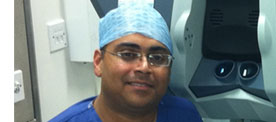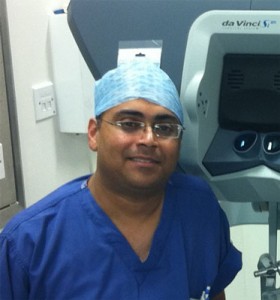Error Training: An emerging teaching tool not to be ignored!
“To err is human, to cover up is unforgivable, to fail to learn is inexcusable”
Sir Liam Donaldson, Former Chief Medical Officer
As a specialist registrar, I recall operating on a large renal tumour along with my mentor Omer Karim (who is now my colleague). As the mobilization was difficult due to neovascularization, he took over and just as the kidney was about to be delivered out, the adrenal vein was avulsed and there was a gush of blood. A Satinsky clamp was placed and to my surprise, Omer asked me to come over and repair the tear, which was successfully done. I remember his wise words even today “Anyone can remove this kidney, what you need to learn is to fix the complications!”
The traditional apprenticeship model of training that exists even today involves the Boss taking over the case whenever there is a complication. This leads to a teaching model wherein the trainee fails to learn on ‘how to get out of the complication’. Indeed, a very wise piece of advice for a young surgeon in training is to work under a ‘not so good’ surgeon for a period of time, as you will then be exposed to many complications (some not mentioned in the books!), learn how to deal with them and try to avoid repeating those same mistakes. The very concept of learning from others’ errors goes into the heart of the very popular meeting held regularly by the Southern Laparoscopic Urology Group (SLUG). The group comprising of highly experienced laparoscopic urologists present their unusual complications and how they were dealt with and what others can learn from that particular complication.
Two recent blogs on bjui.org emphasize the importance of surgical simulation, especially training in the era of EWTD. However, most simulation exercises concentrate on how to perform a proper operation avoiding any errors. Although, this aspect is extremely important, less emphasis has been devoted to developing simulation modules on intra-operative complications and how to deal with them. This is where the concept of Error Training is fast becoming the buzzword among the education psychologists. A well-written article by DaRosa and Pugh on this interesting concept is well worth a read. The authors explore the reasons for the lack of integration of this important aspect into surgical training. There are only a few studies that have looked into the impact of error training on acquisition of skills. A study by Roger et al on the role for error training on surgical technical skill instruction and evaluation found that instruction about common errors, when combined with instruction about the correct performance enhanced the acquisition of the particular surgical skill. Their study suggested a role for the use of errors in surgical technical skill instruction. Similarly, in a study by Brannick et al, who evaluated an error-reduction training program for surgical residents, showed a reduction in the error during surgery. Natalie Bourgeois in her thesis on error training draws the attention for the need to develop error management training (EMT) as opposed to error avoidant training (EAT). EMT is a teaching method that promotes ‘trainee learning’ enabling them to make errors during their simulation exercises. EAT, however, dictates the trainee not to deviate from the prescribed steps and follow the instructions accurately avoiding any errors. Research has now shown that tasks, which involve making deliberate errors during the learning process, may decrease performance during that particular training session, but increases the performance in the ‘transfer environment’. Keith and Frese have shown that errors lead to more exploration during training, increased metacognition, increased emotional control and increased intrinsic motivation, which benefits transfer performance. Thus, there is emerging but limited scientific evidence about integrating error training into the surgical curriculum.
In the future, laparoscopic and robotic simulators should incorporate modules that would expose the trainee to scenarios of intra-operative complications and assess their ability to deal with it. Studies to validate the effectiveness of these modules would be difficult in a patient setting due to obvious ethical considerations. But there is no doubt that this kind of exposure would definitely prepare the trainee’s mind to manage any eventuality. I would end with the quote “First do no Harm. But if you do, have the knowledge to heal the harm”.
Amrith Rao is a Consultant Urological Surgeon at Wexham Park Hospital, Wexham, UK. @urorao
Comments on this blog are now closed.


